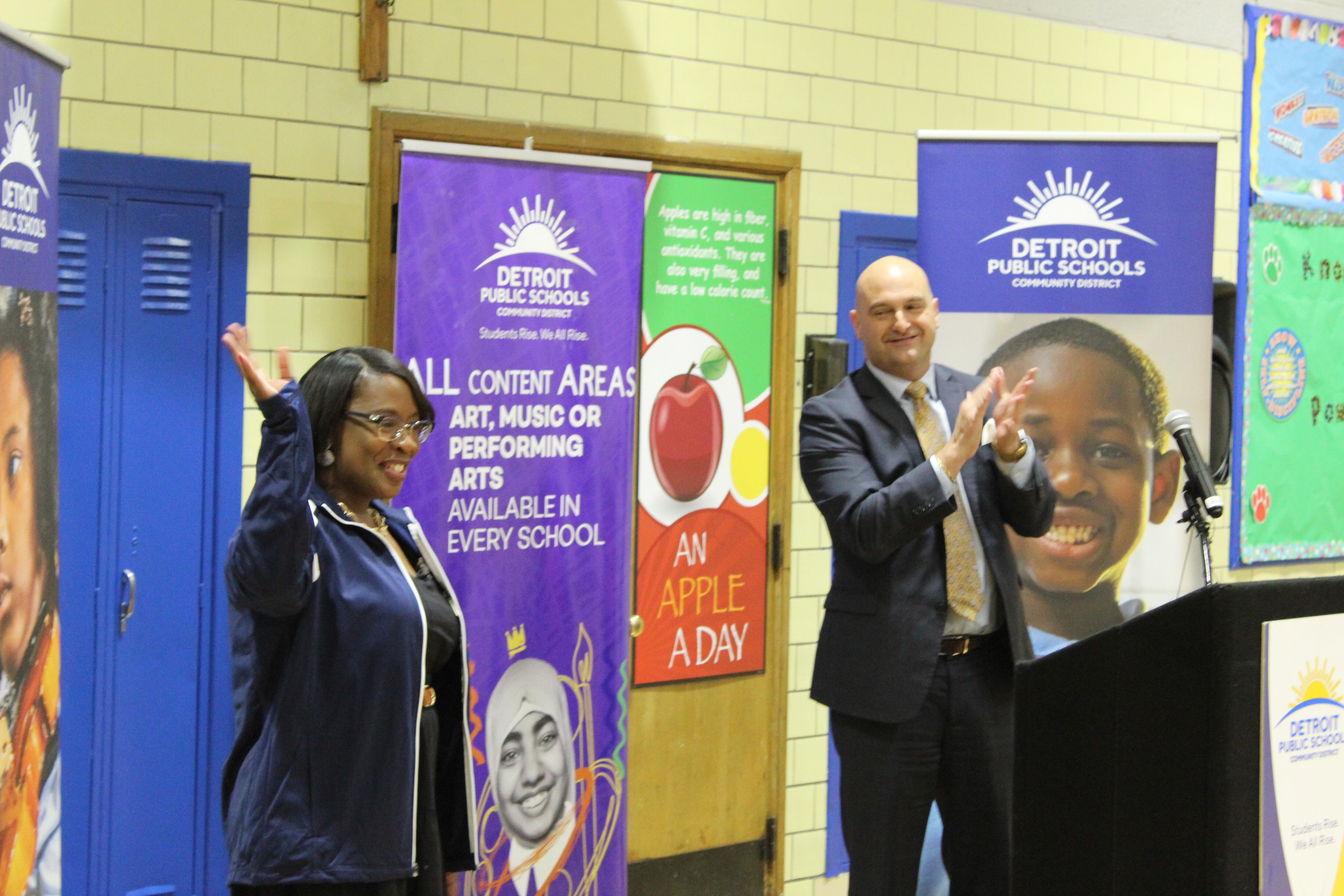Sign up for Chalkbeat’s free monthly newsletter How I Teach to get inspiration, news, and advice for — and from — educators.
Like most teachers across the country, Candice Jackson has intensely felt the impact the pandemic has had on the academic and mental well-being of her third grade students.
Gaps in learning, she noted, “are still readily apparent,” and mental health concerns “are an overlooked issue in the classroom.”
These are issues Jackson, who was named Michigan Teacher of the Year during a surprise announcement last month, says are crucial to resolve. She will have a big platform to push for improvement as the state’s top teacher, representing teachers at State Board of Education monthly meetings and presenting on her learnings.
Jackson said students need counseling services and social-emotional learning programs to get back on track.
“This would involve increasing access to and funding for mental health services, reducing stigma, and providing adequate training to educators on how to recognize and respond to mental health concerns,” she said.
That work would pay off academically as well, she said, because stronger mental health “enhances academic performance, supports overall well-being, enables early interventions, and has short-term and long-term positive outcomes for students.”
Jackson teaches at Mann Learning Community in the Detroit Public Schools Community District and is the first district teacher to win the state honor since the 2006-07 school year. She will now represent Michigan in the National Teacher of the Year contest. Jackson spoke recently with Chalkbeat.

This interview has been lightly edited for length and clarity.
How and when did you decide to become a teacher?
I was an accounting major going into college. Freshman year, I was involved in a program where I was teaching basic accounting and economic principles to children in the community. I immediately loved the interaction with the children and their eagerness to learn the subject area. After I wrestled with the fact that I would make far less money teaching, switching majors was a no-brainer.
What’s your favorite lesson to teach and why?
I am a math teacher, and I love teaching any math lesson that inspires that “Eureka” moment — that moment when students connect the dots and discover the learning. For third graders, it usually happens early in the year when they realize that multiplication is all about making equal groups.
What’s something happening in the community that affects what goes on inside your classroom (or your school)?
The effects of COVID are still very real and affect the classroom even in 2023. I am wrapping up my first uninterrupted school year since 2018-19. The gaps in learning are still readily apparent. My current third-grade students missed those informative years. Years where they learn not only basic skills but how to “do school” — how to walk in a line, how to hold a pencil, how to take turns, etc.
What will it take for students to catch up, not just in Detroit but across Michigan?
Schools need to provide targeted and intensive support to students who have fallen behind. This could involve additional tutoring, small-group instruction, or personalized learning plans to help them catch up on missed concepts. DPSCD has done a great job of this by using academic interventionists to provide targeted intervention. Schools also could consider creating extended learning opportunities such as summer programs, after-school programs, or weekend classes to provide extra instructional time. These programs can focus on essential skills and concepts to bridge the gaps in learning.
Schools also need to engage parents and the wider community in supporting students’ educational recovery. This school year, my school, Mann Learning Community, offered several make-and-take parent engagement events [projects that the family “makes” at the event and then “takes” home as a tool to support essential learning skills], which encouraged parental involvement and provided resources for at-home learning.
How do you approach news events in your classroom? Please provide an example.
Luckily, the average third grader is not keeping up with current events. I tend to leave hard conversations for the parents. But sometimes a conversation needs to be had. Most recently, with the school shooting at Michigan State University, the children had questions about school safety, and I had a candid conversation with them about the incident, including the fact that one of the victims was a former student at another DPSCD school I had taught at. I was able to show them a video I had saved of her from when she was their age.
Tell us about your own experience with school and how it affects your work today.
I grew up in Macomb County, and I had very few teachers that looked like me. My third grade teacher Mrs. Harrington was African American, and she was the epitome of grace, poise, and sophistication. Unfortunately, that was one of the few encounters I had with a teacher that looked like me. That made me want to be what I did not have. Only 7.3% of Michigan’s teaching force is African American, and it is so important for children to see people that look like them in these positions.
What’s the best advice you’ve ever received, and how have you put it into practice?
My first year teaching the principal told me, “Every parent is sending their absolute best to this school. That child who seems unlovable, unruly, and out of control, is the entire world to someone.” Keeping this in mind has helped ground my thinking when dealing with a hard-to-manage child and when communicating with parents. It helps me be less judgmental and more understanding of the story of the children that I teach. You never know what a child or a parent is dealing with, and under the circumstances, this may be their best.
What’s one thing you’ve read that has made you a better educator?
“The Growth Mindset Playbook: A Teacher’s Guide to Promoting Student Success,” by Annie Brock and Heather Hundley was a game changer. When teachers make an adaptive change from a fixed mindset to a growth mindset, student growth is limitless. It is the difference between a child saying, “I can’t do this,” and a child saying, “I can’t do this yet.”
What new issues arose at your school and in your classroom during the 2022-23 school year? How did you address them?
Many children are dealing with mental health issues themselves or dealing with the mental health issue of a parent or caregiver. In Michigan, we need to put as much time, resources, and funding into meeting the students’ mental needs as we do their physical and educational needs. Increasing the number of mental health care professionals in education would be a great start.
How do you take care of yourself when you’re not at work?
Self-care is of utmost importance. I like the quote, “You cannot pour from an empty cup.” Having a work-life balance is important, and carving out time to do things that make you happy is essential. For me, that looks like travel, exercise, and yoga. I especially like hot yoga; if working out in 104 degrees does not make you connect with yourself, I don’t know what will.
What are some of the biggest issues facing the teaching profession right now? What do you want Michigan residents to know about what it’s like to be a teacher today?
One challenge facing education right now is the loss of COVID relief funds given to help mitigate learning loss. Schools must decide which initiatives to throw away and which to keep. Many fear this will lead to loss of traction in many areas.
I would like residents, lawmakers, parents, and stakeholders to understand the delicate balance that is involved in teaching. As educators, we must weave together many pieces to put on the show that is teaching. There is art and science to teaching. Our challenge this next year will be to take the reduced number of pieces we are given, “live” those pieces out, and weave them with best practices to produce productive and thoughtful little people.
Lori Higgins is the bureau chief for Chalkbeat Detroit. You can reach her at lhiggins@chalkbeat.org.







